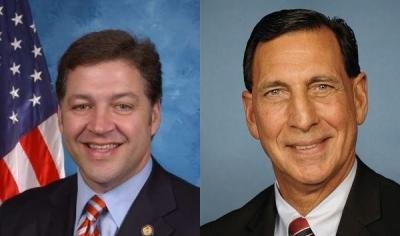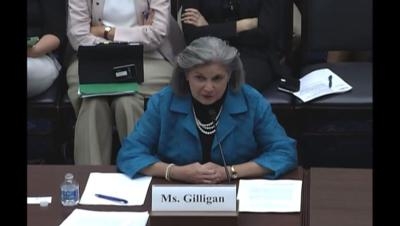First Hearing In A Series Focused On FAA Reauthorization And Reform
The House Transportation Aviation Subcommittee held a hearing Wednesday focused on aviation manufacturing, one of several that will be held in the next several months tied to FAA reauthorization and reform.

"Aviation manufacturing is one of our top exporters, it contributes billions of dollars to the economy annually, and it supports millions of jobs right here in the United States," said Transportation Committee Chairman Bill Shuster (R-PA) (pictured, left).
"America’s long-standing leadership in aviation has been sustained because of our high safety standards, and the dedication of those who design and build aircraft and aviation equipment, and those who oversee that process.
"However, America’s leadership is being threatened. As our manufacturers continue to innovate, FAA’s regulations and workforce have to keep pace.
"It is important that the FAA’s regulations and oversight activities are effective. But it is also important that the FAA’s regulatory processes are efficient and consistent. We shouldn’t have to sacrifice either one for the other," Shuster said.
"I am interested in hearing from our witnesses what Congress can do to help us remain global leaders in aviation manufacturing, while also upholding our safety record. I also want to hear their thoughts on the future of American aviation manufacturing. I don’t want to see America’s aviation industry go the way of our steel, auto, and textile industries."
Subcommittee chairman Frank LoBiondo (R-NJ) (pictured, right) said the Transportation and Infrastructure Committee is looking to the future and how to build a 21st century infrastructure for America. "With this in mind, today the subcommittee will discuss the state of aviation manufacturing, the challenges it faces, where it is heading in the 21st century, and how we ensure the continued success of this segment of the aviation infrastructure," LoBiondo said.
"Aviation manufacturing is a critical sector of our nation’s economy. It contributes billions of dollars and supports millions of good paying American jobs. The United States has always been the gold standard in aviation safety, as well as a world leader in aviation manufacturing. U.S. civil aircraft manufacturing is a top net exporter, with U.S. aviation goods being delivered throughout the world. However recently, global competition, as well as redundant, outdated, and inefficient rules and regulatory processes have jeopardized that lead.
"The FAA plays an important role in ensuring that all aircraft and aircraft components made in the United States meet specific design and production safety standards. This role is absolutely critical to ensure that safety is never compromised. It is at the FAA Tech Center in my district in South Jersey that all certification research is performed. The Tech Center is finding more and more ways to improve airport designs and procedures, as well as develop fire suppression capabilities for aircraft.
"Yet, the certification process has its problems. As manufacturers design and build to meet these standards, they can experience needless and harmful bureaucratic delays, both internationally and domestically. These delays can be very detrimental to U.S. manufacturers trying to compete globally where every day of delay can mean real losses in both profits and jobs. As the aviation industry expands its international reach, and introduces new technologies and innovations, it is critical that the FAA certification and regulatory processes adapt and respond. The FAA must leverage the expertise of the private sector and fully utilize all the authorities it has been granted. Enabling our aviation manufacturers to enter new markets and innovate, while ensuring the highest level of safety, is a priority of this subcommittee."

In her prepared remarks, FAA Associate Administrator Margaret Gilligan (pictured) listed a series of accomplishments during the past several years. "We set the policy for expanding delegation to companies regarding the processes by which aircraft are maintained. We expanded the framework to delegate noise and emissions compliance findings. We eliminated the delay in certification project initiation by developing a new resource management process. We’ve also created a new training program to minimize subjectiveness in our audits of industry," Gilligan said.
"We are also taking steps to allow applicants that have demonstrated a history of technical competency in certain aspects of a certification program to be allowed to work through certification approvals without a specific finding by the FAA. This policy gives applicants greater control over their business schedules and highlights their responsibility to design and produce safe compliant products."
She also talked about changes in the Aircraft Certification Service (AIR). "Aviation products are designed and produced in locations around the world, and an international web of networks and complex business arrangements challenge AIR’s traditional regulatory model. Technological advances and business model changes are precipitating higher rates of change and increasing the need for organizational agility as the environment shifts. The industry is both expanding and contracting much faster than the FAA can ever respond. Meanwhile, the expectations of industry, government and the flying public continue to increase, demanding we do things faster—and with greater levels of safety," Gilligan said. "The FAA Modernization and Reform Act section 312 sought to review and reform the certification process and make it more nimble, but we are moving beyond simple reform to transformation.
"To meet these demands AIR is undergoing a transformation focused on 3 goals:
- Refresh the certification strategy,
- Invest in management systems to improve performance, and
- Improve our organization and invest in our people.
"Refreshing the certification strategy means FAA will take a systems approach, relying on industry’s processes and competencies based on risk management. This minimizes our involvement along the certification path to those areas of higher risk."
 Airborne 04.16.24: RV Update, Affordable Flying Expo, Diamond Lil
Airborne 04.16.24: RV Update, Affordable Flying Expo, Diamond Lil ANN's Daily Aero-Term (04.20.24): Light Gun
ANN's Daily Aero-Term (04.20.24): Light Gun Aero-News: Quote of the Day (04.20.24)
Aero-News: Quote of the Day (04.20.24) Aero-News: Quote of the Day (04.21.24)
Aero-News: Quote of the Day (04.21.24) ANN's Daily Aero-Term (04.21.24): Aircraft Conflict
ANN's Daily Aero-Term (04.21.24): Aircraft Conflict




